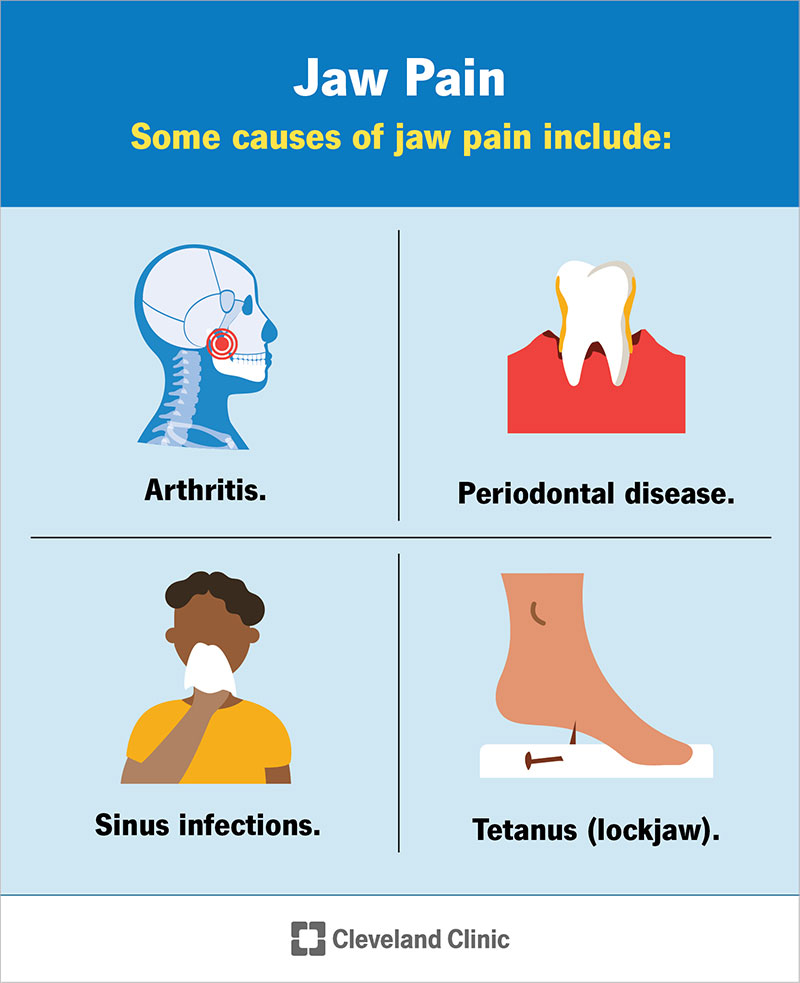Jaw pain is a common issue that affects millions of people in the U.S. Jaw pain may be mild or can be severe and affect your quality of life. Many factors can cause jaw pain, such as grinding your teeth, gum disease or a toothache. Jaw pain may also be a symptom of a serious issue, including a broken or dislocated jaw or a heart attack.
Advertisement
Cleveland Clinic is a non-profit academic medical center. Advertising on our site helps support our mission. We do not endorse non-Cleveland Clinic products or services. Policy

Image content: This image is available to view online.
View image online (https://my.clevelandclinic.org/-/scassets/Images/org/health/articles/24447-jaw-pain)
Jaw pain is a common issue that affects millions of people in the U.S. Jaw pain may be an ache, stiffness or pain in your jawbone or the area around your ears. Jaw pain may be mild or can be severe and affect your quality of life. Many factors can cause jaw pain, such as grinding your teeth, gum disease or a toothache. But jaw pain may also be a symptom of a serious issue, including a broken or dislocated jaw or a heart attack.
Advertisement
Cleveland Clinic is a non-profit academic medical center. Advertising on our site helps support our mission. We do not endorse non-Cleveland Clinic products or services. Policy
Jaw pain may feel like:
Pain on one side of your jawbone may be a symptom of a temporomandibular joint disorder (TMD) or tooth issue.
Sometimes, some jaw pain goes away on its own. Talk to a healthcare provider if you have jaw pain that lasts for more than a week.
Other times, jaw pain is a medical emergency. Call 911 or go to the emergency room if:
Temporomandibular joint disorder often causes jaw pain. Other common causes include:
Advertisement
That depends on why your jaw hurts. If you have a broken jaw, you may need surgery. If your jaw hurts because you have an abscessed tooth or periodontal disease, you’ll need dental treatment. If you have TMD (sometimes called TMJ), a provider may recommend you try the following:
Healthcare providers may use the following treatments:
You can prevent jaw pain by:
You should talk to a healthcare provider if you have jaw pain that lasts more than a week.
Severe jaw pain from a broken or dislocated jaw is a medical emergency. Likewise, severe pain that starts in your chest and your shoulders and moves to your jaw may be a heart attack symptom. Call 911 if you think your jaw is broken or dislocated or you have heart attack symptoms.
Millions of people in the U.S. have jaw pain. Sometimes, jaw pain happens if you injure your jaw, but most jaw pain happens because you have issues with your teeth or you have a temporomandibular disorder that affects your jawbone and joints. If you have jaw pain that lasts for more than a week, talk to a healthcare provider. They’ll find out why your jaw hurts and treat the issue.
Advertisement

Sign up for our Health Essentials emails for expert guidance on nutrition, fitness, sleep, skin care and more.
Learn more about the Health Library and our editorial process.
Cleveland Clinic’s health articles are based on evidence-backed information and review by medical professionals to ensure accuracy, reliability and up-to-date clinical standards.
Cleveland Clinic’s health articles are based on evidence-backed information and review by medical professionals to ensure accuracy, reliability and up-to-date clinical standards.
If you have conditions affecting your ears, nose and throat, you want experts you can trust. Cleveland Clinic’s otolaryngology specialists can help.
